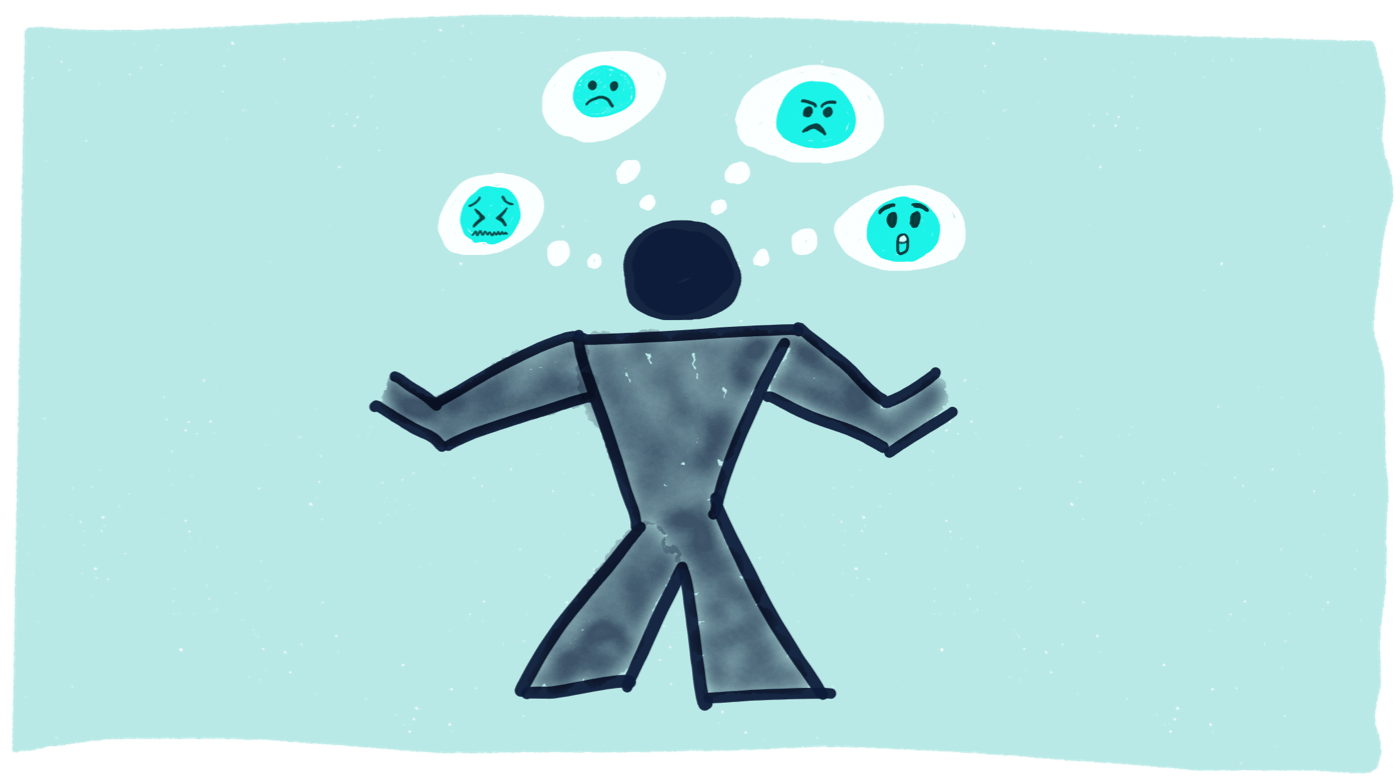Self-criticism is something we all fall into from time to time. But for some it’s practically a way of life.
For the chronically self-critical, even the tiniest mistakes trigger tidal waves of self-directed anger and judgment:
- Ugh, why am I such an idiot! I’ve done this a thousand times and I manage to screw it up every time.
- That presentation was a disaster. I know I’m no good at public speaking so why didn’t I just let Ben take the lead…
- That’s a terrible thing to think… What’s wrong with me?!
Thankfully, no matter how self-critical you are it’s always possible to change—to learn to become kinder, gentler, and more compassionate with yourself. Because here’s the thing:
Fundamentally, self-criticism is a habit. And habits can be changed if you know what’s maintaining them.
If you’d like to be less self-critical, the first step is to identify why you keep doing it in the first place.
In the rest of this article, I’ll walk through four of the most common psychological reasons why you might be stuck in the habit of self-criticism.
1. It was modeled at a young age
Many of our strongest habits are learned early in life as children—and self-criticism is no exception.
As children, we learn to be self-critical in two main ways:
- We hear other people close to us being self-critical of themselves. If a child routinely hears a parent calling themselves “dumb” or “stupid” each time they make a mistake, it’s very possible the child mimics that verbal behavior and builds the habit themselves.
- We internalize criticism of ourselves. If you have someone at a young age regularly criticizing you and telling you how stupid you are, it’s not a stretch that you will start doing the same thing to yourself.
But no matter what happened to you as a kid, here’s what you need to understand:
Just because childhood was the origin of your self-criticism doesn’t mean that’s what’s making it stick around today.
With any kind of habit, it’s important to distinguish the initiating cause from the maintaining cause.
While an overly-critical parent may have been the initiating cause of your self-criticism habit early on, more than likely there are other things in your present-day life that are feeding that habit and causing it to stick around.
Gaining insight into the origins of our problems is helpful to a point, but ultimately it’s the present that holds the key if you want to stop self-criticism for good.
2. You believe being tough on yourself is motivating
Consciously or not, many people believe that being tough on themselves motivates them to perform better and achieve.
It’s one of our culture’s most deeply embedded assumptions about human nature that if you’re not constantly being hard on yourself, you’ll end up lazy, unproductive, and ultimately worthless.
We see this reflected in our stories and art. Pick any random movie about sports and there’s a very good chance there’s a scene early on in the film when the coach has to “get tough” and criticize his players in order to “make men out of them,” after which they go on to win the championship or whatever.
The fallacy here is that correlation doesn’t mean causation. Just because athletes got yelled at and criticized and then eventually went on to do great things doesn’t mean that being criticized actually caused the success.
The bigger point is this:
Most people are successful despite their self-criticism, not because of it.
In my work with clients—many of whom are very high-achieving and success-oriented—I often convince them to substitute a habit of self-compassion for self-criticism. When they make a mistake or fail at something, they practice being kind and supportive with themselves rather than mean and judgmental.
In 6+ years of running this experiment, I’ve never seen anyone’s performance suffer when they reduce the habit of overly-critical self-talk. And very often, their performance actually improves—sometimes dramatically!
It seems intuitive that to achieve great things we need to be hard on ourselves. But there’s a big difference between holding yourself to high standards and being a jerk to yourself when you struggle.
If you can find the courage to let go of self-criticism, I think you’ll find that you have far more motivation and drive than you did before.
3. You’re afraid of appearing arrogant
Some people are so terrified of being seen as arrogant, that they’ll beat themselves to an emotional pulp to ensure that they stay humble—or at least appear that way…
Many of the harshest self-critics I work with grew up in environments where it was imperative to always appear humble and never be thought of as vain or arrogant. And one of the ways they learned to do that was to criticize themselves.
Then, as adults, the habit persists because they assume that it’s their humility-inducing self-criticism that keeps them in good graces with important people in their lives—bosses, spouses, friends, mentors, etc.
But here’s the problem:
You can’t actually control whether other people think you’re humble or arrogant.
Naturally, this leads to a feeling of helplessness. Because we are in fact helpless to control other people and their opinions of us!
Many people get stuck in the habit of self-criticism because it gives them the illusion of control. Since they can’t actually control what other people think of them, they turn to something they can control—their own self-talk—and channel all that anxious energy into that.
And while it feels good momentarily to take control and distract yourself from feeling helpless and out of control, reality is reality.
We are all far more helpless than we like to admit. And most of life is far, far beyond our control and influence. While you can live in denial about this by losing yourself in habits that temporarily give the illusion of control, the long-term side effects make this a losing proposition.
Whether you appear humble or arrogant to other people is their concern, not yours. And no amount of self-criticism will change that.
When you let go of the need to manage other people’s impressions, you’ll find it far easier to let go of the need to criticize yourself.
4. You think self-compassion is self-indulgent
Ultimately, the cure for self-criticism is self-compassion. Sadly, many people won’t try it because they don’t understand it.
Whenever I work with a client who’s especially self-critical and hard on themselves, the concept of self-compassion comes up eventually. But I’ve learned to be strategic about how and when I introduce it because, for many people, they see self-compassion as—in the words on one client—“a bunch of woo-woo, new-age, self-indulgent nonsense.”
And I get it… A lot of the people who talk about self-compassion do it in a way that’s not very clear or comprehensible and so it comes off as gibberish. Or worse, it seems somehow narcissistic or self-indulgent.
But if you think about it…
Just because you’re not a jerk to yourself doesn’t mean your self-indulgent.
And in fact, what could be more narcissistic than constantly obsessing over your own flaws and mistakes!
Self-compassion isn’t about telling yourself you’re wonderful,l and everybody likes you, and other unrealistic nonsense. Self-compassion just means treating yourself with respect—the same respect you would give unthinkingly to others.
To put it even more simply:
Self-compassion means treating yourself like you would treat a good friend.
Imagine a good friend you work with came to you after a meeting and said, “Oh my God, I’m such an idiot! I can’t believe I forgot the name of the lead person on that new account. Everyone’s gonna think I’m unqualified to be on this project.”
How would you respond to that person?
- Would you tell them, “Yes you’re an idiot, a total screw-up, and you should probably just quit.” Of course not!
- You also probably wouldn’t lie to them and say, “Are you kidding, that was the best meeting you’ve ever led!”
- Instead, I bet you would be supportive and maybe say something like “Yeah, I know it feels to make a mistake like that in front of others. But we all do it sometimes. The rest of the team probably didn’t think too much of it.”
Self-compassion doesn’t mean excessive positivity or self-indulgent narcissism—it’s just being kind to yourself.
Ultimately, we’re all going to keep making mistakes and failing in life. It’s inevitable. If you really want to get out of the habit of self-criticism, you need to replace it with a healthier alternative.
Learning to build self-compassion is a pretty good place to start.
All You Need to Know
Chronic self-criticism is a habit. And if you want to break that habit, you need to understand why it’s there and what’s maintaining it. Because it’s only when you’re deeply aware of your self-criticism and the functions it serves that you will be able to truly let it go.
Four of the most common psychological reasons for self-criticism are:
- Modeling at an early age
- Using self-criticism as motivation
- Fear of appearing arrogant
- Believing self-compassion is self-indulgent





11 Comments
Add YoursHi Nick
Thanx as usual for interesting post and how it makes who learn that you can unlearn what habits you picked up as a kid. One teacher can make you feel unworthy and you hang on to this habit until you at last learn to be kind and have compassion for self.
Kind regards
Lynette.
You’re very welcome, Lynette! Glad it was interesting!
I wonder if this fits into the fact why your children feel they have no need to call their parents once in awhile in their busy life to see if all is good with their parents. Trying to figure out.????????
That’s a tough one, Jim!
Thank you, Nick, I continuously appreciate your articles. I’m an executive coach and have been forwarding your posts to some clients with these great insights. Great help for them and very refreshing for my coaching.
Thanks, Roberto. I appreciate the kind words and the shares 🙂
#1 and #3 hit hard for me. I personally think this habit started when I was told not to “feel good” about myself too much by parents in order to be humble. So the self criticism grew more and more. It was my default response to everything. I wasn’t even aware of this until I came across this article. I have a lot of self reflecting to do. Thank you Nick!
Thanks again, Nick. As always, a great piece of writing, yet this one here was even more precise. For myself, the last point was the most impressive (at the same time telling myself – yeah, that’s absolutely it). And, I guess it will take time to change this, but let’s do it! Practice: self-compassion is not self-indulgence! Thank you, Nick!
Nice work here Nick, and thanks. I’m sharing this with my Breakthrough for Men group as a discussion starter with a shout out to your newsletter.
Thanks Ed—I really appreciate that!
Reading this it’s like it’s written about me. Makes me realise how common this is